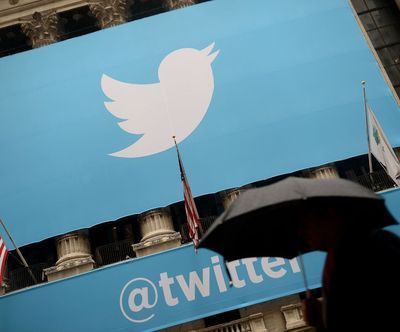La mort du lecteur

A banner on the front of the New York Stock Exchange; �� Emmanuel Dunand/AFP/Getty Images
By ANDREW IRWIN
Last weekend I went to the Barbican for this year���s Battle of Ideas ��� two days of ���high-level, thought-provoking public debate���. ���From Literature to Twitter: The death of the reader?��� was the vague title of one such discussion, but it was perhaps thanks to that vagueness that the debate proved fruitful.
Gathered around the table were Teresa Cremin, an Open University Professor of Education; Frank Furedi, the author and social commentator; Laurence Scott, a lecturer in English and writer on technology; and Sam Leith, the Spectator���s literary editor; with David Bowden of the Institute of Ideas as chair. The speakers seemed to respond to slightly different versions of the verb-free question. Scott focused on internet culture and the potential it has created for new literary forms. Furedi was troubled by the apparent infantilization of students, of whom increasingly less reading is ��� allegedly ��� demanded. Cremin convincingly discussed the limitations of an educational system that views reading in terms of proficiency benchmarks. When the arguments did overlap, however ��� and, crucially, conflict ��� there was a sense that this could be a productive dialogue.
Furedi argued, for example, that in a world where everyone with a Twitter account can consider himself both reader and writer, we lose something of the old value order that let us rate some literary works and some authors more highly than others. Leith responded that, far from there being a flattening-out of information, hierarchy is in fact intrinsic to the way we organize data on the internet ��� how would we ever find anything, if Google didn���t rank our results? ��� before later conceding that how things are ordered by Google���s indexing does not necessarily reflect literary importance.
Leith was perhaps the most optimistic about the current state of reading in the age of digital reproduction ��� and, to my mind, the most compelling. In his opening remarks, he declared that there simply is no crisis. Everything, in his estimation, is ���tickety-boo���. As people turn from television to the internet, they swap an essentially picture-based medium for an essentially textual one. It seems that we may be doing a lot more reading these days. If Twitter and hyperlinked-article hopping are killing our attention spans, he wondered, how is it that the novel is flourishing while sales of short stories languish? Television series such as The Wire also demonstrate that an appetite remains for complex, long-form narratives.
Scott, meanwhile, made the interesting case that Twitter, as well as muddying the clean divide that used to exist between author and reader, allows for a novel form of storytelling. There is a new place for silence and space in narrative. If a writer tells a story in 140-character flickers of information, we must work harder to fill in the gaps, to build up the picture, while remaining conscious of what is missing.
There was, it struck me, an unspoken premiss underlying the debate, one apparently accepted not only by the speakers but also by many of the audience members who posed questions: that reading matters. Should we care whether fewer people are doing it ��� and especially whether they are reading the canonical, ���important��� works? The speakers seemed tacitly to reject a ���health���-focused idea of its benefits, one that sees reading as carrots or kale for the mind ��� with Furedi explicitly condemning the language of medicalization that can enter the discourse. There seemed to be a general consensus that books were important because of the ���love��� of reading they can inspire. Yet if someone does not love reading, and if there is no ���health��� benefit to be gained, it���s difficult to know what to say to convince him or her that spending time reading about people who do not exist is a sensible thing to do. It���s hard to swallow Jeremy Bentham���s adage that pushpin is as good as poetry ��� but it���s also tricky to say why it���s not. It would have been fun to watch the debaters give it a go.
A review of Frank Furedi's book Power of Reading: Socrates to Twitter will appear in a future issue of the TLS.
Peter Stothard's Blog
- Peter Stothard's profile
- 30 followers



